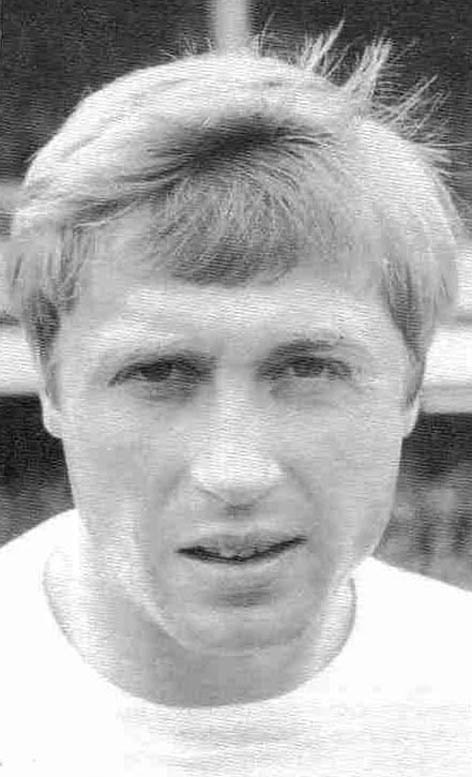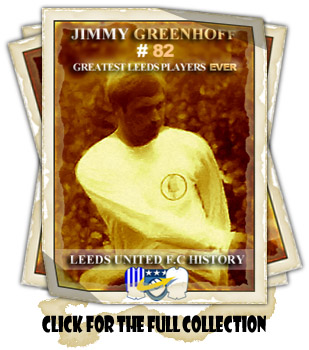

Greenhoff: James (Jimmy)
1963-1968
(Player Details)
Forward
Born: Barnsley: 19-06-1946
Debut: v Southampton (a): 15-05-1963
5’10” 11st 2lb (1968)
#82 in 100 Greatest LUFC Players Ever

Greenhoff was in the Barnsley side that won the 1960-61 English Schools Trophy and, after
representing Yorkshire Schoolboys, joined Leeds and completed his apprenticeship in August
1963. He started at right half, but was pushed forward with the advent of Billy Bremner, and
made a valuable contribution to the side which established itself as a First Division force
in the mid-1960s. There was no finer sight in football than Greenhoff with the ball at his
feet making swift, surging runs from the right hand side of midfield and he looked, and was,
a natural footballer, with skills beyond those of the average player. His natural ability,
his ball control, his distribution, his composure, his shooting ability set him above them.
But in a team with Billy Bremner emerging in midfield and Bobby Collins and Johnny Giles
already firmly established and fellow juniors Eddie Gray and Peter Lorimer, both pushing
for recognition and to a lesser degree Rod Belfitt and Terry Hibbitt on the fringes, it was
hard to win a spot in midfield. The young Greenhoff was given a chance in attack and soon
proved his worth scoring seven League goals in 1966-67 as Leeds came fourth in the League
and reached the Semi-Final of the F.A. Cup, to be eliminated by Chelsea, and were beaten in
the Final of the Inter-Cities Fairs Cup by Dynamo Zagreb. Greenhoff did gain his only pieces
of silverware in the following season, but that was after the acquisition of Mick Jones he
found himself in the vacant right wing spot for the injured Mike O'Grady and, with Jones
unavailable in the League Cup, he was part of the team that beat Arsenal 1-0 at Wembley to
lift the League Cup and was also a part of the team that won the Inter-Cities Fairs Cup by
beating Ferencvaros in the two-legged final. He scored regularly and was second leading
goalscorer to Peter Lorimer, in the League with eleven goals, three more than Mick Jones.
With the signing of Mick Jones and the emergence of so many talented youngsters, Greenhoff
was sold to Birmingham City for £70,000 in August 1968 in the middle of a Cup Final. He had
played in the first leg of the Inter-Cities Fairs Cup against Ferencvaros, coming on as
substitute but was sold before the second leg had taken place. Greenhoff made a huge impact
at Birmingham. He scored fourteen goals in thirty-one League games, including four in one
game, a 5-4 home win over Fulham, on 5th October 1968 and scored fifteen goals in a total
of thirty-six games in all competitions as Birmingham finished the 1968–69 season in
seventh spot in the Second Division. It was while at St Andrew's that Greenhoff pick up his
first representative honours when he scored once in four appearances for the England
Under-Twenty-Three team. He opened the Scoring for England in his debut in the 3-1 win over
Wales at Wrexham on 2nd October 1968 This was followed by an appearance on his home turf,
as England drew 2-2 with Holland on 13th November 1968 at St Andrew's. His third cap came
against the same opposition as the Dutch won 2-1 in Deventer on 22nd May 1969, his fourth
coming three days later in a 1-0 win over Belgian "B" at Ostend. It took a fee of £100,000
in August 1969 from First Division Stoke City to persuade Birmingham to part with their
prize asset. He made a similar impact at the Victoria Ground, scoring nine goals as the
club ended in ninth place. He became part of the revival of Stoke City in the early 1970's
as Tony Waddington rebuild the Potter's team and dispensed with the older players. He
built the new team around Greenhoff, Gordon Banks, Terry Conroy and John Mahoney. In
addition to consolidating their League position, Stoke started to make an impact in the
Cup competitions. City reached the 1971 FA Cup Semi-Final where, after being 2-0 up
against Arsenal, the game finished 2-2. Arsenal won the replay 2-0. The next season Stoke
again lost to Arsenal in the FA Cup Semi-Final, but they had success when they won the
League Cup final with a 2-1 victory over Chelsea. Stoke became a team to be feared and it
was they that ended Leeds United's twenty-nine game unbeaten start to the 1973-74 season.
Leeds had started the game well, taking an early 2-0 lead through goals from Billy Bremner
and Peter Lorimer and a Leeds win looked a formality. However, Alan Hudson and Mike Pejic
levelled the scores before half-time and Denis Smith’s diving header inflicted on
Greenhoff’s schoolboy club their first loss. Despite paying £325,000 for England
goalkeeper Peter Shilton in the close season Stoke could not make the final push towards
the top spots and finished fifth in the 1974-75 season, just four points behind the top
placed Derby County. Greenhoff had found the net fourteen times in League games and won
the TV award for goal of the season for his goal in a 3-0 win at St Andrew's against his
former club Birmingham City on 7th December 1974, when he scored with a superb volley.
Tony Waddington had appointed Greenhoff club captain and recommended that England Manager
should give him his chance in the England team. Despite the many players Revie gave a
chance to Greenhoff was not in their numbers and he remained in the top drawer of
players that never played for England. He did get one more representative honour with
his fifth England Under-Twenty-Three cap as an over-aged player in the first leg of the
European Championship Quarter-Final as England were defeated by Hungary 3-0 in Budapest
on 10th March 1976. Acknowledged by Waddington as the best player he ever signed, his time
at the Victoria Ground was coming to an end. In January 1976 wind had blown the roof off
the Butler Street Stand and the club faced a damages bill of £250,000. Players had to be
sold, including Greenhoff, and he made a £200,000 move to Manchester United in November
1976 where he would join up with his younger brother Brian. Greenhoff soon repaid that fee.
While with Stoke City he scored seventy-six goals in two hundred and seventy-four League
games. Always an unselfish player and not a prolific goalscorer, he still scored
ninety-seven goals from three hundred and thirty-eight games in total, which left him as
the ninth highest overall goal scorer for Stoke City in the club's history. After making
his debut in a 1-1 draw at Leicester City on 20th November 1976, he scored in a 2-0 F.A.
Cup Semi-Final win over Leeds and scored the winner, with a chested goal from a Lou Macari
shot, in the 2-1 win over Liverpool in the 1977 Final, when he picked up a Winner's medal.
Despite having his best years behind him he still retained all his attributes that most
clubs had coveted for so long and he gaveManchester four good seasons. Initially bought as
a partner for striker Stuart Pearson. It proved to be a successful partnership that brought
goals for them both. After Pearson was injured Manager Dave Sexton bought Joe Jordan in 1978,
and a new partnership was forged. 1978-1979, was Greenhoff's best season at Old Trafford. He
scored seventeen goals and finished as the club’s leading scorer and he was elected as
"Player of the Year" by the fans. He also played in the 1979 FA Cup Final, but was on the
losing team, as Arsenal won 3–2, with a goal in the final minute from Alan Sunderland. After
that his career was blighted by injury and in December 1980 he was allowed to leave the club
for Crewe Alexandra. Greenhoff played his final game for Manchester on 6th December 1980 in
a 2-2 draw with Norwich City at Carrow RoadWhile at Old Trafford he had scored twenty-six
goals in ninety-seven League games, one goal in four League Cup ties, nine goals in
nineteen F.A. Cup ties, and played one game in each of the Charity Shield, UEFA Cup and
Cup-Winners' Cup without scoring. A total of thirty-six goals in one hundred and
twenty-three games. He had a short spell as Manager, after he had replaced his former
boss Tony Waddington, but he was only at Crewe for a couple of months, scoring four
goals in eleven League games before moving to Toronto Canada in April 1981, where he had
a season with Toronto Blizzard, scoring six goals in twenty-four games. He joined Port
Vale in August 1981 and scored five times in forty-eight League games. After nearly two
years at Vale Park, Greenhoff left on 1st March 1983 and ended his playing career after
a spell as Player-Manager at Rochdale. He played sixteen League games at Spotland
without scoring and was sacked as Manager on 12th March 1984. He later became part of
the coaching staff at Port Vale. He later coached youngsters at holiday camps and then
ran his own insurance business in the Stoke area, but in 1996 he had financial problems
when he found out his partner in that business had been conning him out of large sums
of money. He then worked in a warehouse and later for a pharmaceutical company in
Stoke-on-Trent.